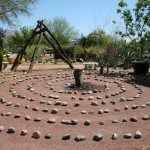Spiritual exploration is not for the fainthearted. If all you want from your spiritual journey is success and ease, then forget spiritual direction. In most all spiritual traditions—and especially Christianity—it can be a painful process to “see the light.” One Quaker notion is that even while we desire the light of Christ in our heart, that same light shines into all the dirty corners of our life causing us to see parts of ourselves that we spend a lot of... Read more

















